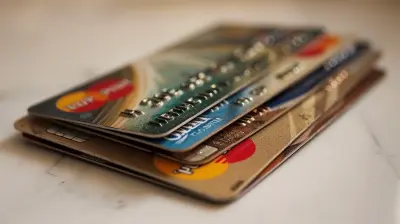How to Stay Focused When Life Throws Financial Curveballs
29 September 2025
Let’s face it — life has a knack for throwing unexpected punches just when you think you’ve got it all figured out. One day you’re cruising along, bills paid, savings stacking up, and the next... BAM! Your car needs repairs, your job gets shaky, or an emergency sends your budget into a tailspin. Financial curveballs don't just hit your wallet—they take an emotional toll too.
But here’s the thing: While you can’t always predict life’s punches, you absolutely can master how you respond to them.
In this guide, we’re diving into how to stay focused when life knocks you off your financial game. We’ll talk mindset, actionable tips, and how to turn crisis into clarity. So buckle up. We’re unraveling this together.
Why Staying Focused Matters More Than Ever
When you’re hit with a financial setback, your mind can feel like a tornado. Stress, fear, and even shame creep in — draining you emotionally and mentally. You might panic, freeze up, or start making impulsive decisions. Sound familiar?Staying focused is your anchor. It's what keeps your brain in the game long enough to make smart moves instead of reactive ones. Focus cuts through the noise and helps you see possibilities when your situation feels impossible.
Let’s break it down.
Step 1: Accept What You Can’t Control
I know — easier said than done. But the truth is, stressing over things outside your control is like chasing the wind.- Lost your job? You can’t undo that.
- Got hit with unexpected medical bills? They’re here now.
- Market took a dive right when you started investing? Join the club.
Here’s your new mantra: Control the controllables.
Focus on what you can do next. Acceptance doesn’t mean giving up; it means letting go of emotional weight that’s not helping you move forward. It clears mental space — which is your most valuable asset right now.
Step 2: Hit Pause, Not Panic
When chaos hits, avoid jumping into "fix-it-fast" mode. Resist the urge to put everything on your credit card or sell your investments in a frenzy.Instead, pause.
Take 24–48 hours to breathe. Re-ground yourself. Journal it out. Talk to someone you trust. This is not avoidance — it’s intentional. It’s the calm before the comeback.
Once your head is clearer, you’ll think more rationally and plan with strategy rather than survival instinct.
Step 3: Reassess Your Financial Priorities
Now that you’ve paused, it’s time to look at where things stand.Ask yourself:
- What are my absolute necessities right now?
- What expenses can I cut or delay?
- Do I need to start earning extra income, even temporarily?
- Can I restructure any of my debt?
Your financial plan during a crisis isn’t about getting ahead—it’s about staying afloat and minimizing damage. That survival mindset helps you conserve energy, protect what matters most, and set yourself up for recovery later.
📌 Pro Tip: Use the “Four Walls” method popularized by Dave Ramsey. Cover food, utilities, shelter, and transportation first. Everything else comes after.
Step 4: Get Ruthlessly Organized
Anxiety thrives in disorganization. But when everything’s spelled out in front of you — your income, expenses, debts, and goals — suddenly, the monster in your head isn’t so scary.Here’s what might help:
- Create a bare-bones budget focusing only on essentials.
- List all income sources, even small gigs.
- Track all your bills and due dates.
- Build a crisis spreadsheet (or even a paper notebook) — something that keeps your brain uncluttered.
Think of it like cleaning up a messy closet before deciding what clothes you actually want to keep. Clarity breeds confidence.
Step 5: Don’t Go It Alone — Ask for Help
Let me put this bluntly: You’re not weak for needing help. You’re human.Ask yourself:
- Are there local community programs or nonprofit resources you can lean on?
- Can you negotiate bills or defer payments temporarily?
- Can you talk to a financial coach or advisor for guidance?
Even reaching out to a friend or family member just to talk — that counts. Financial stress can make you feel isolated and ashamed, but vulnerability opens doors. You’d be surprised how many people relate to financial hardship.
Step 6: Protect Your Mindset Like It’s Gold
Because it is.Your mindset can either fuel your comeback or sabotage it. If you keep telling yourself “I’m just bad with money” or “I’ll never get out of this hole,” guess what? You’re building a self-fulfilling prophecy.
Now’s the time for mental resilience.
💡 Try this:
- Start your day with intention: One positive affirmation. One small goal.
- Limit your time on social media: Comparing your life to someone else’s highlight reel? Hard pass.
- Celebrate micro-wins: Paid a $50 bill today? That’s a victory. A win is still a win.
Step 7: Take Small, Consistent Actions
Imagine you’re lost in a forest. What gets you out — sprinting in random directions or walking slowly with a compass?The same applies to your finances.
Tiny, intentional steps done consistently lead you out of crisis. You don’t need to fix everything by Friday. You just need to move forward, even if today’s progress is simply deciding to skip eating out.
Consistency beats intensity.
Step 8: Tune Out the “Shoulds”
- “You should already have six months of savings.”- “You should’ve bought insurance.”
- “You should know better.”
Let’s trash the judgment, okay?
You’re here now, doing the best you can now. The past is a lesson, not a life sentence. Don't let your inner critic take the wheel — it doesn’t know how to drive.
Step 9: Set New, Realistic Goals
Once you’ve stabilized things, it’s time to look forward again (yes, seriously). This isn’t about going back to your old goals — it’s about creating new ones that fit your current reality.Maybe it’s:
- Building a tiny emergency fund, even just $250.
- Paying off one credit card.
- Saving for a career course that opens new income doors.
Goals give you direction and that "why" that keeps you going. Write them down. Post them on your mirror. Make them visible and real.
Step 10: Reflect and Rebuild Stronger
Every financial curveball teaches you something. Maybe you learn the importance of an emergency fund. Or maybe you recognize signs of burnout that led to job loss. Whatever the lesson, scoop it up, hold it close, and turn it into wisdom.This is how you become financially bulletproof next time. You’re not just regaining balance — you’re growing roots that can weather any financial storm.
Bonus Tips to Keep You Mentally and Emotionally Strong
Sometimes, it’s not just about money. It’s about how you feel. So here are a few mindset hacks to help you stay focused:🧘 Practice Mindfulness
Seriously — breathe. Meditation can be a game-changer. Even five minutes of quiet can hit the mental reset button.✍️ Journal Your Way Through It
Your brain is dealing with a lot. Put it on paper. Write out your fears, your hopes, your next steps. Writing gives you space to process without spiraling.🏃 Move Your Body
Stressed? Go for a walk. Lift something heavy. Dance in your kitchen. Movement clears mental cobwebs and helps reduce anxiety.Final Thoughts: You're Not Alone in This
If you’re in the middle of a financial mess, it doesn’t mean you’re broken. It means you’re alive — navigating the twists and turns of real life. Staying focused during financial hardship isn’t about pretending everything’s fine. It’s about doing what you can, when you can, with what you have.So, take a deep breath. You’ve got this.
Let the curveballs come — you know how to swing back.
all images in this post were generated using AI tools
Category:
Savings GoalsAuthor:

Angelica Montgomery
Discussion
rate this article
1 comments
Diana Blair
Great tips! Focus on priorities to navigate financial challenges effectively.
October 8, 2025 at 3:03 AM

Angelica Montgomery
Thank you! Prioritizing is key to staying resilient during tough financial times. Glad you found the tips helpful!


